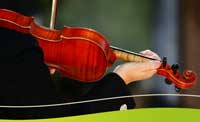
![]() Violin One on One
Violin One on One
The Right size Violin for Children
![]() Parent's Guide to Music Lessons
Parent's Guide to Music Lessons
How can I get my child to practice?
When Should Children Start Music Lessons?
![]() Guide to Great Music Practice
Guide to Great Music Practice
![]() Music Know how
Music Know how
 |
||||
When Should Children Start Music Lessons? Introducing children to music, like introducing them to reading, should not wait for formal classes to start. Just as you read to your very young children, you should sing to them (whether you consider yourself a decent singer or not), dance with them, teach them singing games like "Ring Around the Rosy", and share with them the music that you like. Exposing them to classical music, using the many videos, books, and tapes available, can't hurt, either, but at a very young age they will be most engaged by what engages you. In some communities, there are parent/child group classes that introduce children to the basic concepts of music. To find out what's available in your area, check with any group that organizes extra-curricular activities for young children. This may be your local park district, YMCA, public library, music academy, community college, or local university. The emphasis at a very young age should be on how fun music is. The ideal time to start formal music training can be anywhere from age two to age twelve, depending on what you want. Note: Motivated teenagers - i.e. teenagers who tell you that they really want to learn to play an instrument - are, of course, also very good candidates for beginning music lessons. But, the teenage years being what they are, this is usually not a good time for you to start insisting on lessons and practice. If you want your child to begin before about age 6, she will probably have to start on the Suzuki method on piano, violin, viola, or cello. Very young children are not developmentally ready to learn to read music, for the same reason that they are not yet ready to learn to read books. The Suzuki method is specifically designed to teach young children by focussing on ear training and on the proper physical techniques for playing the instrument. Learning to read music is delayed until the student is ready for it. Of course, older students can benefit from the Suzuki approach, also. If your child has vision problems or simply responds better to audial and physical approaches to learning than he does to visual teaching methods, Suzuki may be best. Between the ages of six and ten, your child can start piano, violin, viola, cello, recorder, or guitar with just about any teaching method. There are plenty of piano methods for children who still have small hands, and the stringed instruments (including guitar) can be found in small sizes for children. If a child this age really wants to play a wind instrument, soprano recorder is the best choice. Many instruments do not come in child sizes and are physically too much for a small child to handle. At about the age of ten, most children become big enough to begin playing most instruments. If you have been waiting to start your child on trombone, flute, or harp, for example, now is a good time to start. Most school band and string programs begin at about this age. (If you or your child is very determined on a particular instrument, you may want to begin lessons before school instruction begins, in order to ensure that she is not assigned a different instrument.) Remember, it's never too late to start music lessons. If you are an adult and wished you had had piano lessons as a child, find yourself a piano teacher! If your high school sophomore wishes he could be in the band, have him talk to the band director. Most will be happy to suggest an instrument (probably one that the band does not have enough of) and a teacher. A few months worth of lessons and practice should have a sixteen-year-old playing at a level that is acceptable in most high school bands. |
||||